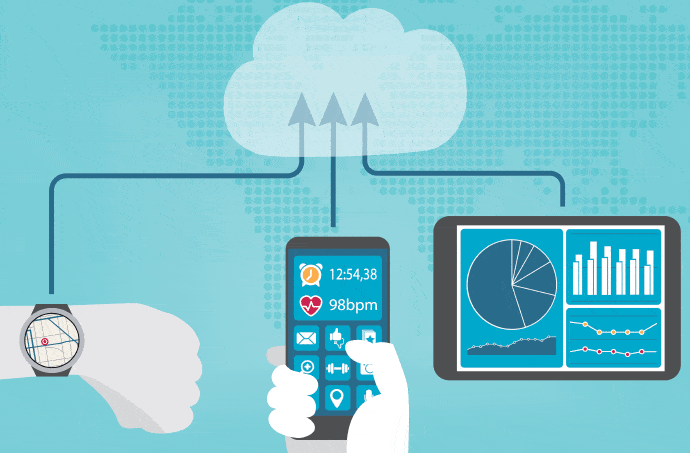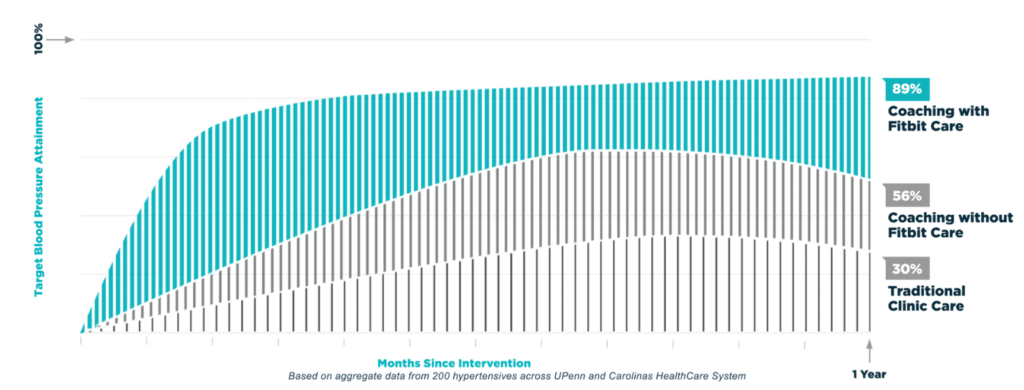Fitbit Care: Improving Care Delivery in a Digital World

The new Fitbit Care platform is utilizing data to break down the silos in health care delivery to improve patient outcomes and to provide personalized care.
What is Fitbit Care?
Fitbit Care is a care platform that provides health coaching and virtual care to consumers. The services on the platform are currently marketed to health plans, health systems, and employers. The platform leverages Fitbit’s devices to provide personalized digital interventions to improve wellness and disease management. [1]
Innovating with the use of data
The Fitbit Care platform leverages large amounts of data that is collected from individuals’ wearable devices and self-tracking to enable the delivery of care. When Fitbit first launched in 2009, similar to other tracking devices that launched around the same period, the wireless-enabled devices were only able to measure certain metrics such as number of steps walked per day, heart rate, and steps climbed. [2]
Fitbit Care Platform [7]
With Fitbit Care, medical professionals are now able to utilize the vast amount of data that is collected from devices to support individuals suffering from chronic illnesses such as diabetes and hypertension. [3] For example, for Type 2 diabetes patients, medical professionals are able to support weight loss targets by setting activity targets and tracking blood glucose levels, giving coaches the ability to intervene remotely. [4]
Functionality that supports the move to value-based care
Fitbit Care currently acts as an aggregator of patient data and insights, which then allows medical professionals and care coaches to make decisions based on real-time data and to intervene before a health emergency. For example, a care coach might decide to pay an in-home visit to a hypertension patient who has repeatedly missed their weight target and has reported increasing levels of high blood pressure. As healthcare continues to move to value-based care, a healthcare delivery model where providers, including hospitals and physicians are paid based on patient health outcomes, the importance of real-time data will only grow. [5] The availability on a platform like Fitbit Care will allow providers to track and better measure health outcomes and ensure healthcare providers are fairly compensated for value among their patient population.
Key elements of the platform [6]
- Wearables and devices for self-tracking of activity, sleep and heart rate. The data taken from tracking devices enables patients to be in a better position to manage their care and enable medical providers to provide personalized care.
- Fitbit Plus is an app that serves as a health coaching tool. The app also connects metrics with health care data, medications and trends from activity. In the future, the hope is that an app like this is able to intervene, if needed, by utilizing AI to identify patterns and act on it without intervention from a medical provider.
- The final piece of the platform is health coaching and virtual care. Coaches work with participants to create personalized care plans. Coaches are also able to connect with individuals via app, phone and in-person meetings. Some of the common issues that leverage health coaching and virtual care are weight management, smoking and management of conditions like heart disease, diabetes and depression.
The future is bright
Improved Outcomes [8]
Fitbit Care can deliver value to individuals that are utilizing the wearable device and generate health data to parties that would like to have access, such as employers, health systems and health plans. For individuals, they can better understand their overall health and reach their health goals, while in some cases, having direct support from medical professionals can keep them accountable and allow them to intervene when needed. For parties such as employers, they can now help support their employees in living a healthy lifestyle. As the platform evolves over the next few years, we shouldn’t be surprised if the Fitbit Care platform becomes an integral part of millions of lives, especially those that suffer from chronic illnesses such as Hypertension and Type 2 diabetes.
References
- fitbit.com. (2019). Fitbit Launches Fitbit Care, A Powerful New Enterprise Health Platform for Wellness and Prevention and Disease Management. [online] Available at: https://investor.fitbit.com/press/press-releases/press-release-details/2018/Fitbit-Launches-Fitbit-Care-A-Powerful-New-Enterprise-Health-Platform-for-Wellness-and-Prevention-and-Disease-Management/default.aspx [Accessed 24 Feb. 2019].
- (2019). Eight years of Fitbit news leading up to its planned IPO. [online] Available at: https://www.mobihealthnews.com/43423/eight-years-of-fitbit-news-leading-up-to-its-planned-ipo [Accessed 24 Feb. 2019].
- Fitbit Health Solutions. (2019). Fitbit Care health coaching – Fitbit Health Solutions. [online] Available at: https://healthsolutions.fitbit.com/healthcoaching/ [Accessed 24 Feb. 2019].
- Toms guide. (2019). Fitbit versa new features. [online] Available at: https://www.tomsguide.com/us/fitbit-versa-new-features,news-27149.html [Accessed 24 Feb. 2019].
- NEJM Catalyst. (2019). What is value-based healthcare? – NEJM Catalyst. [online] Available at: https://catalyst.nejm.org/what-is-value-based-healthcare/ [Accessed 24 Feb. 2019].
- Dignan, L. (2019). Fitbit launches Fitbit Care platform for health care plans, expands Humana partnership | ZDNet. [online] ZDNet. Available at: https://www.zdnet.com/article/fitbit-launches-fitbit-care-platform-for-health-care-plans-expands-humana-partnership/ [Accessed 24 Feb. 2019].
- (2019). Fitbit, Blue Cross Blue Shield Launch Connected Health Partnership. [online] Available at: https://mhealthintelligence.com/news/fitbit-blue-cross-blue-shield-launch-connected-health-partnership [Accessed 24 Feb. 2019].
- Fitbit Health Solutions. (2019). Fitbit Care health coaching – Fitbit Health Solutions. [online] Available at: https://healthsolutions.fitbit.com/healthcoaching/ [Accessed 24 Feb. 2019].





Two thoughts for you. One, it seems a platform like this desperately needs scale to succeed, and I’m unconvinced Fitbit can pull it off. Given that Fitbit Care is based on data from Fitbit devices, the more Fitbit devices people are wearing, the more data the company has and the more it learns about specific actions patients and/or care provides can take to improve outcomes. But the converse is also true: if Fitbit is eclipsed by Apple Watch, some new Google wearable, Under Amour gear, or any other wearable in this crowded and seemingly very faddy space, the value of the Fitbit Care platform drops precipitously. Also, if Fitbit Care only has access to data from Fitbit wearables but not access to other medical devices like pacemakers or even just wearables by other companies, Fitbit Care’s picture of the patient’s health will be critically limited, and another company that has the credibility and regulatory approval to integrate these different data sources (like Epic, athenahealth, or Cerner) will be far more valuable and likely disintermediate Fitbit Care (if Fitbit Care refuses, integration could be a big selling point for a competitor). Moreover, only these digital health record companies will have access to more sensitive information like patient histories, which make any recommendations far more relevant, tailored, and reliable. Lastly, I bet health systems have some of these same concerns and will be extremely reluctant to share sensitive data with Fitbit, in case it fizzles out as just another fad in the next few years.
Second (less related to platforms specifically), although I’m not someone especially paranoid about privacy, the dangers here seem real, especially in the hands of a private company like Fitbit (yes, you could easily reply, “But Google!” and my same worries would apply). I’m not sure consumers want their bosses to know how healthy they are, what their blood pressure is, when they’re sleeping, and potentially, where they are at all times… opens up a lot of doors to uncomfortable involvement by an employer and potentially discrimination against less healthy folks on criteria entirely unrelated to their job performance. We need more regulation around data ownership before I want my employer giving me a $100 bonus for eating right.
Very interesting innovation in the extremely important Health Care industry. A solid move in terms of preventive medicine to save costs within the system. My main thought:
I am trying to understand the strength of the network effects of this platform and whether it will give Fitbit a sustainable advantage. To some extent, the more people use it, the better the data and treatment options available, costs may decrease, and more medical providers and coaches can sign up. Alternatively, I can see a competitor establishing a similar service from scratch without much difficulty (especially given how fragmented the healthcare industry is). I’m curious to what extent Fitbit is increasing the stickiness (or network effects) of its products to defend from other players from entering the space.